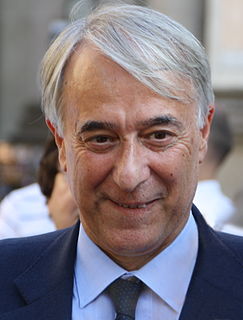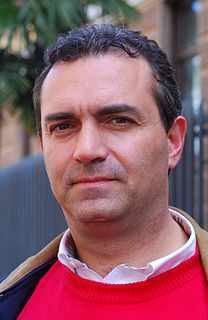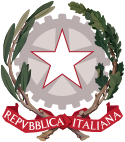The 2012 Italian local elections were held on 6–7 May, with a second round on 20–21 May. In Italy, direct elections were held in 948 comuni: in each comune were chosen mayor and members of the City Council. Of the 948 comuni, 28 were capoluoghi and only 176 had a population higher than 15,000 inhabitants (10,000 for Sicily).

Italy, officially the Italian Republic, is a country in Southern Europe. Located in the middle of the Mediterranean Sea, Italy shares open land borders with France, Switzerland, Austria, Slovenia and the enclaved microstates San Marino and Vatican City. Italy covers an area of 301,340 km2 (116,350 sq mi) and has a largely temperate seasonal and Mediterranean climate. With around 61 million inhabitants, it is the fourth-most populous EU member state and the most populous country in Southern Europe.

The comune is a basic administrative division in Italy, roughly equivalent to a township or municipality.

Sicily is the largest island in the Mediterranean Sea and one of the 20 regions of Italy. It is one of the five Italian autonomous regions, in Southern Italy along with surrounding minor islands, officially referred to as Regione Siciliana.
Citizens living in Italy who were 18 or over on election day were entitled to vote in the local council elections. The deadline for voters to register to vote in the 6–7 May elections was midday on Tuesday 3 April 2012.
For the first time there weren't provincial elections around Italy because they were abolished by the Law n.3660 of 4 December 2011. Instead of a president, the provincial government would be entrusted to a Special Commissioner.
Other elections were taken on 10–11 June with a second round on 24–25 June in 65 comuni of Sardinia: important cities like Alghero and Oristano chose their mayors and councils.

Sardinia is the second-largest island in the Mediterranean Sea. It is located west of the Italian Peninsula and to the immediate south of the French island of Corsica.

Alghero, also known as L'Alguer, is a town of about 44,000 inhabitants in the Italian insular province of Sassari in northwestern Sardinia, next to the Mediterranean Sea. Part of its population descends from Catalan conquerors from the end of the Middle Ages, when Sardinia was part of the Crown of Aragon. Hence, the Catalan language is co-official and known as the Alguerès dialect. The name Alghero comes from Aleguerium, which is a mediaeval Latin word meaning 'stagnation of algae'.

Oristano is an Italian city and comune, and capital of the Province of Oristano in the central-western part of the island of Sardinia. It is located on the northern part of the Campidano plain. It was established as the provincial capital on 16 July 1974. As of December 2017, the city had 31,671 inhabitants.
Total voter turnout on the first round was of 66.9%, lower than that of 2007; 667 municipalities in the first round had a mayor elected (except Sicily).
Voting System
All mayoral elections in Italy in cities with a population higher than 15,000 use the same voting system. Under this system voters express a direct choice for the mayor or an indirect choice voting for the party of the candidate's coalition. If no candidate receives at least 50% of votes, the top two candidates go to a second round after two weeks. This gives a result whereby the winning candidate may be able to claim majority support, although it is not guaranteed.
The election of the City Council is based on a direct choice for the candidate with a preference vote: the candidate with the majority of the preferences is elected. The number of the seats for each party is determined proportionally.
This page is based on this
Wikipedia article Text is available under the
CC BY-SA 4.0 license; additional terms may apply.
Images, videos and audio are available under their respective licenses.

The 2011 Italian local elections were held on 15–16 May, with a second round on 29–30 May. In Italy, direct elections were held in all 1,177 comuni and 11 provinces: in each comune were chosen mayor and members of the City Council, in each province were chosen president and members of the Provincial Council. Of the 1,177 comuni, 30 were capoluoghi and only 105 had a population higher than 15,000 inhabitants.

The 2010 Italian local elections were held on different dates; most on 29–30 March oncurrently with the Regional elections.

Municipal elections were held in Rome on 13-14 and 27–28 April 2008, at the same time as Italian general elections. The outgoing Mayor of Rome, Walter Veltroni (PD), was candidate in the general elections, so he resigned after only two years from the previous municipal election in Rome. The center-right candidate Gianni Alemanno, who was defeated by Veltroni in 2006, faced center-left candidate Francesco Rutelli who was chosen to head his party's list.

Municipal elections were held in Rome on 16 November 1997. The outgoing Mayor of Rome Francesco Rutelli (Greens) faced the center-right candidate businessman Pierluigi Borghini.

Municipal elections were held in Milan on 15–16 and 29–30 May 2011, at the same time as Italian local elections.

Municipal elections were held in Rome on 26–27 May 2013 and a second round was held on 9–10 June, at the same time as other Italian local elections.

The 2013 Italian local elections were held on different dates; most on 25–26 May, with a second round on 8–9 June. In Italy, direct elections were held in 720 comuni: in each comune were chosen mayor and members of the City Council. Of the 720 comuni, 20 were capoluoghi and only 171 had a population higher than 15,000 inhabitants.

The 2014 Italian local elections were held on 25 May, with a second round on 8 June. In Italy, direct elections were held in 4086 comuni: in each comune were chosen mayor and members of the City Council. Of the 4086 comuni, 29 were capoluoghi and 243 had a population higher than 15,000 inhabitants.

The 2015 Italian local elections were to be held on 31 May, with a second round on 14 June, concurrently with the Regional elections. In Italy, direct elections were held in 1063 comuni: in each comune were chosen mayor and members of the City Council. Of the 1603 comuni, 15 were capoluoghi and 120 had a population higher than 15,000 inhabitants.

Municipal elections will be held in Bologna on 5 and 19 May 2016. The centre-left candidate Virginio Merola was elected mayor at the second round with 54.64% of votes.

Municipal elections were held in Naples on 5 June 2016.

Municipal elections were held in Turin, northern Italy, in May 2016. Chiara Appendino, the candidate of the Five Star Movement, was elected after defeating former mayor Piero Fassino in the runoff.

The 2016 Italian local elections were held on 5 June, with a run-off, where necessary if a candidate for Mayor obtained less than 50 percent of votes in the first round, held on 19 June.

The 2017 Italian local elections were held on Sunday 11 June. If necessary, a run-off vote was held on Sunday 25 June. The term of mayors and councils will last five years, unless an early election is triggered.

The 2018 Italian local elections were held on different dates; most on 10 June, with a second round on 24 June. In Italy, direct elections were held in 720 comuni: in each comune were chosen mayor and members of the City Council. Of the 783 comuni, 21 were capoluoghi and only 112 had a population higher than 15,000 inhabitants.

The 2019 Italian local elections will be held on 26 May 2019, together with the 2019 European election, with a second round on 9 June. Direct elections will be held in 3843 comuni: in each comune mayor and members of the City Council are going to be chosen. Of the 3841 comuni, 30 are capoluoghi.













